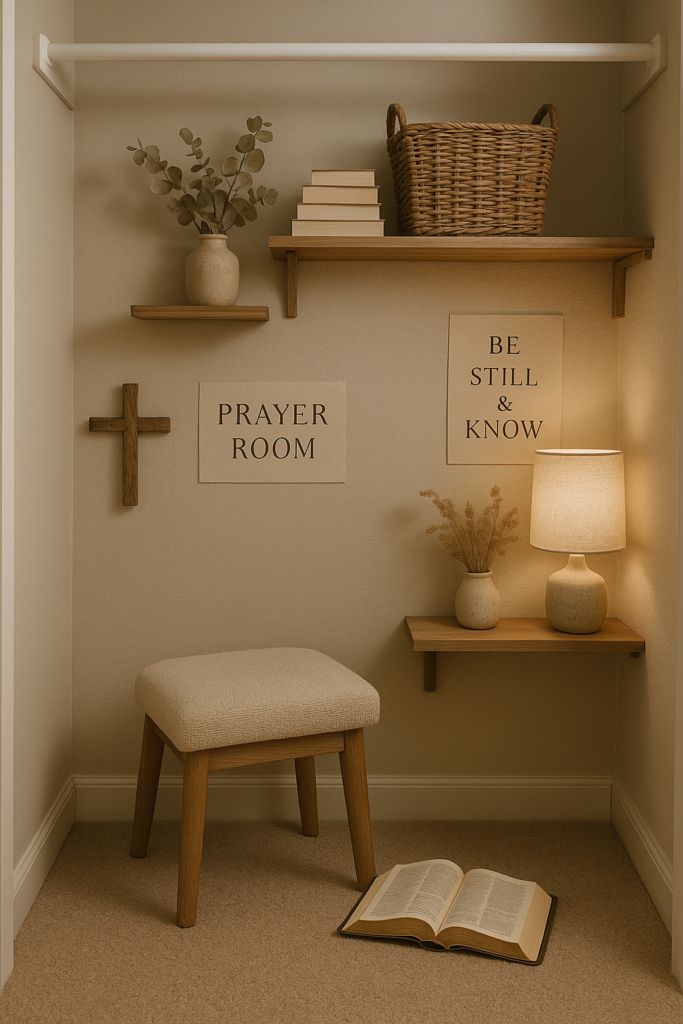When you hear the phrase “war room,” your mind might first picture a military command center, filled with maps, strategies, and leaders planning their next move. In a physical battle, the war room is where strategies are drawn up, weaknesses are studied, and strength is gained through preparation.
But for Christians, the war room looks very different. It isn’t filled with maps and generals. Instead, it is a private space—sometimes a closet, a corner of a room, or simply a chair—set aside for prayer. The war room is where battles are fought on your knees rather than with weapons. It is where tears fall, prayers rise, and hearts align with God’s will.
If you’ve ever seen the Christian film War Room, you know how powerful the imagery of a prayer space can be. That movie wasn’t just about a physical room—it was about transforming life’s greatest battles by learning how to fight spiritually instead of relying only on our own strength.
Today, I want to dig into what the Bible says about prayer, why having a war room can change your life, and how you can create one of your own.

Why Do We Need a War Room?
Life is full of battles. Some are external—financial struggles, health issues, broken relationships. Others are internal—fear, doubt, temptation, or discouragement. While we often try to fix problems with our own reasoning and strength, the Bible reminds us that the real fight isn’t always visible.
Paul writes in Ephesians 6:12 (ESV):
“For we do not wrestle against flesh and blood, but against the rulers, against the authorities, against the cosmic powers over this present darkness, against the spiritual forces of evil in the heavenly places.”
This verse makes it clear: our battles are spiritual. If that’s the case, we need spiritual weapons. Prayer is one of the most powerful tools God has given us. But prayer doesn’t just happen—it thrives in intentional spaces. That’s where the war room comes in.
Biblical Foundations of a War Room
Even though the Bible doesn’t use the exact phrase “war room,” the concept is deeply biblical. Jesus Himself taught the importance of intentional, private prayer.
In Matthew 6:6 (ESV), Jesus says:
“But when you pray, go into your room and shut the door and pray to your Father who is in secret. And your Father who sees in secret will reward you.”
That sounds a lot like the definition of a war room—a private space where you meet with God. It doesn’t have to be elaborate. It just needs to be set apart for communion with Him.
Throughout Scripture, we see examples of God’s people carving out intentional places for prayer:
- Daniel prayed three times a day, even when it was forbidden (Daniel 6:10).
- David often withdrew to pour out his heart in psalms and prayer.
- Jesus frequently went to solitary places to pray (Mark 1:35, Luke 5:16).
If prayer was this central to their lives, shouldn’t it be to ours as well?
What Happens in a War Room?
The war room is more than just a location—it’s an atmosphere where you meet God intentionally. Here are a few things that take place when you commit to a war room prayer life:
1. You Learn to Surrender
Life’s battles often feel overwhelming, but the war room teaches us to place those burdens in God’s hands. Instead of striving to control everything, we surrender in prayer and trust His plan.
2. You Develop Strategy
Just as generals strategize in battle, you can use your war room to pray specifically over areas of your life. Whether it’s your marriage, your children, your job, or your ministry, the war room helps you name the battle and bring it before the Lord.
3. You Build Consistency
It’s easy to say, “I’ll pray whenever I think about it.” But when you have a dedicated war room, prayer becomes intentional. It builds a habit that grounds your faith.
4. You Strengthen Your Faith
Over time, as you track prayers and see God answer, your faith deepens. The war room becomes a testimony space where you remember God’s goodness.
How to Create Your Own War Room
You don’t need a spare room or even a closet to create a war room. All you need is a dedicated space where you can meet with God. Here are some steps to get started:
Step 1: Choose a Space
Find a quiet place in your home where you can focus without distractions. It might be a closet, a corner of your bedroom, or even a chair by the window.
Step 2: Gather Supplies
Consider keeping a Bible, a journal, sticky notes, or prayer cards nearby. Many people like to post Scripture verses or written prayers on the wall as reminders of God’s promises.
Step 3: Write Out Your Battles
Think about the areas in your life where you need God’s intervention. Write them down and post them in your war room. This helps keep your prayers focused and intentional.
Step 4: Set a Routine
Commit to meeting God in your war room daily. It doesn’t have to be long—even 10–15 minutes can make a difference. Over time, your war room time will become something you crave.
Step 5: Record God’s Faithfulness
Keep track of answered prayers. Nothing strengthens faith more than remembering how God has moved in the past.

Real-Life Testimonies from War Rooms
The impact of a war room isn’t just theoretical—it’s real. I’ve heard countless testimonies of lives transformed through prayer in these intentional spaces:
- A couple on the brink of divorce began using a war room to pray separately for each other. Over time, bitterness gave way to healing, and their marriage was restored.
- A mother with a prodigal child posted her child’s name on the wall of her war room and prayed daily. Months later, the child returned home and gave their life to Christ.
- Individuals struggling with anxiety found peace by turning their war room into a space of surrender, replacing fear with Scripture-filled declarations of God’s promises.
These aren’t just coincidences—they’re evidence of God moving when His people pray.
Overcoming Obstacles to a War Room
You may be thinking, “This sounds great, but I just don’t have time for a war room.” Or maybe, “I’m not good at prayer.” Let me encourage you:
- Start small. Even 5 minutes a day in your war room can change things.
- Remember, it’s not about perfect words. Romans 8:26 reminds us that the Spirit intercedes for us when we don’t know what to pray.
- Focus on presence, not performance. God isn’t grading your prayers—He’s longing for relationship with you.
The War Room as a Lifestyle
While a physical war room is powerful, the ultimate goal is to carry the spirit of the war room into everyday life. Prayer doesn’t stop when you leave the room. Instead, your time in the war room equips you to face the day with spiritual strength.
Think of the war room as training ground. Soldiers don’t live in the war room—they live on the battlefield. But the strategies and preparation they receive in the war room guide them when the real fight begins. In the same way, your war room equips you to live victoriously in Christ each day.
Final Encouragement
The enemy wants us distracted, discouraged, and defeated. But the war room is where we fight back. It’s not flashy, and it may not look like much to the world, but heaven moves when God’s people pray.
Jesus has already won the ultimate battle through His death and resurrection. The war room simply aligns our hearts with His victory. It gives us space to remember His promises, claim His truth, and walk in His strength.
If you don’t have a war room yet, I encourage you to create one. It doesn’t have to be perfect—it just has to be intentional. God isn’t looking for a Pinterest-worthy setup; He’s looking for your heart.
Call to Action
Now I’d love to hear from you!
- Do you already have a war room or a special place where you pray?
- What battles are you currently bringing before God?
- Have you seen Him answer prayers in ways that encouraged your faith?
Share your experiences in the comments below—I’d love for this to be a space where we can encourage one another in building stronger prayer lives. Your story might be the very testimony someone else needs to keep fighting their own battle in prayer.
Let’s start a conversation. How has the war room impacted your spiritual walk?





